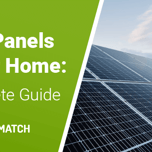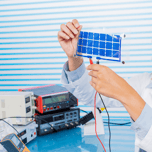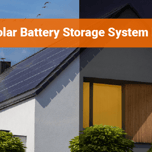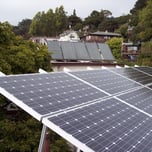Answer these simple questions and we will find you the BEST prices
Which type of solar quotes do you need?
It only takes 30 seconds
100% free with no obligation

Get up to 4 quotes by filling in only 1 quick form

Slash your energy bills by installing solar panels

For the average 2-3 bedroom house
- GreenMatch
- Solar Energy
- Solar Panels
- Solar Panels for Camping
Solar Panels for Camping: October 2025 Guide
Solar Power for Camping Purposes
Solar power has many advantages for homeowners, above all the possibility to save money on electricity bills while reducing their impact on the environment. However, solar energy has the additional benefit of being accessible even in remote areas, as long as the sun is shining. That is especially important for people who live in areas with difficult access to electricity, and those who keep moving: motor home owners and campers. Here are the answers to all the questions you may have about photovoltaic panels for camping purposes.
If you are thinking about going solar, you can use Greenmatch to receive up to 4 free, non-binding quotes from our certified suppliers. Simply fill in the form on the top of the page and you will receive your personalised quotes without having to spend any more time on researching potential suppliers and brands.
What Are the Benefits of Solar Panels for Camping?
- Solar power is a renewable, green source of electricity, plus it’s completely free;
- It allows you to travel to remote areas with no access to electricity;
- You can save even more money by avoiding power sites’ fees;
- You will be free to go wherever you want without having to worry about how to power your fridge.
How Much Power Can You Get from Solar Panels?
The amount of electricity that your panels can produce depends on several factors. First of all, different sizes of solar panels come with different power outputs. The amount of sunlight that the panels receive also has a fundamental influence, depending on geographical position and time of the year. Temperature is another element: contrary to popular belief, solar panels work best in cool climates with less than 25 degrees Celsius, although the power loss in higher temperatures is very small (0,3%).
How Do You Use Solar Panels While Camping?
You can choose between mounting the panels on the roof of your vehicle - recommended for tourers - or using mobile panels or roll-up “solar blankets” that you can place wherever they can absorb more sunlight. The second options are best suited for campers since the position is fundamental to optimise the panels’ efficiency. Even the smaller inclination changes can affect output, so be very careful about how you align them, check if they are shaded in any way and regularly remove dust. Dust can be problematic especially for roof-mounted panels that are constantly exposed and gather more dirt. However, solar panels are very easy to clean and just need to be wiped with non-abrasive materials to avoid scratches.
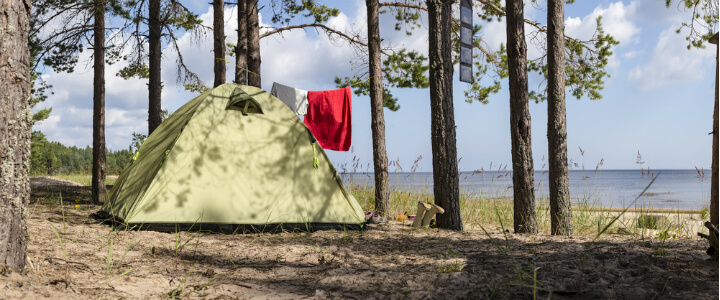
What Do You Need in Your Solar Panel Camping Kit?
A full solar panel kit for camping needs to have a few things. First of all, the panels need to be portable and compact, hence many people choose thin film panels. You will, of course, need a solar battery, plus an inverter and solar regulator (or charge controller, fundamental to avoid damages to your battery caused by overcharging).
- You can choose between three different types of solar panels. 'Classic' panels are made of crystalline silicon and come in mono- and polycrystalline models. Monocrystalline panels are slightly more efficient (which means that they convert more sunlight into electricity) and thus more expensive than polycrystalline ones. Amorphous silicon or thin film panels are cheaper but less efficient than their crystalline competitors, and, therefore, need much more space to produce the same amount of energy. However, these panels have the huge advantage of being flexible and foldable, since they are made of a thin layer of photovoltaic material that can be sprayed on flexible plastic. We, therefore, also refer to them as flexible solar panels. Crystalline panels are rigid and more fragile, therefore they need to be covered by a glass layer and are not so easy to maneuver. Moreover, the efficiency of thin film panels is slightly less affected by high temperatures.
- Choosing a battery for camping is definitely easier since deep cycle models are highly recommended. That is because they can be discharged many times and deeply without reductions to their efficiency. However, you should know that discharging the battery below 20% will negatively impact on its lifespan.
- An inverter is needed to convert the DC power generated by the solar panels into AC power that all of your appliances can use. When choosing an inverter you need to make sure it would adequately power your devices.
How Do You Know How Much Power You Need to Generate?
It’s essential to know about your power needs before purchasing solar panels in order to choose the right system. The wrong information may lead you to choose the wrong panels, battery and inverter, so you may end up not having enough power and possibly damaging the regulator and battery. You can easily calculate how much power you need by adding up all of your appliances’ power draws, often shown on the products’ labels.
What Can You Power with Solar Panels?
Usually, portable solar panels are used to power fridges, lights and small devices like laptops and TVs. Fridges consume the majority of the electricity, accounting for up to 60% of the total. LED lights are recommended since they have a lower power draw compared to traditional ones. Additionally, you should know that heating appliances have relatively high power draw and may quickly drain your battery.
We strive to connect our customers with the right product and supplier. Would you like to be part of GreenMatch?


